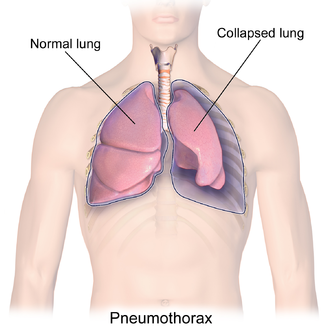Pneumothorax
(Redirected from Spontaneous pneumothorax)
Jump to navigation
Jump to search
Pneumothorax is air within the potential space between the parietal pleura and visceral pleura leading to a partial or complete collapse of the lung.
General
- Clinical diagnosis (typically by radiology) or autopsy diagnosis.
Causes
- Primary.[1]
- No underlying cause.
- Secondary - underlying disease.
- Emphysema.
- Bullous disease.
- Blunt force trauma - esp. rib fractures.
- Interstitial lung disease.[citation needed]
- Iatrogenic.
- Lymphangioleiomyomatosis.
- Birt–Hogg–Dubé syndrome.[2]
Sign out
Lung (Left Upper Lobe), Resection:
- Emphysematous changes with lung belbs/bullae.
- Focal subpleural fibrosis and pigmented airspace macrophages.
- NEGATIVE for significant inflammation.
- NEGATIVE for significant interstitial fibrosis.
- NEGATIVE for malignancy.
- Please see comment.
Comment:
The wedge-shaped pattern of fibrotic healing seen in the pleura is typical
of spontaneous pneumothorax.
Alternate
A. Lung, Right Upper Lobe - Apical Segment, Wedge Resection: - Mild emphysematous changes. - Focal subpleural fibrosis. - NEGATIVE for significant inflammation. - NEGATIVE for significant interstitial fibrosis. - NEGATIVE for malignancy. - Please see comment. B. Lung, Right Upper Lobe - Posterior Segment, Wedge Resection: - Mild emphysematous changes. - Focal subpleural fibrosis. - NEGATIVE for significant inflammation. - NEGATIVE for significant interstitial fibrosis. - NEGATIVE for malignancy. - Please see comment. Comment: The wedge-shaped pattern of fibrotic healing seen in the pleura is typical of spontaneous pneumothorax. The emphysema present may be a contributory factor; however, other causes must be excluded clinically.
See also
References
- ↑ Papagiannis, A.; Lazaridis, G.; Zarogoulidis, K.; Papaiwannou, A.; Karavergou, A.; Lampaki, S.; Baka, S.; Mpoukovinas, I. et al. (Mar 2015). "Pneumothorax: an up to date "introduction".". Ann Transl Med 3 (4): 53. doi:10.3978/j.issn.2305-5839.2015.03.23. PMID 25861608.
- ↑ Furuya, M.; Yao, M.; Tanaka, R.; Nagashima, Y.; Kuroda, N.; Hasumi, H.; Baba, M.; Matsushima, J. et al. (Nov 2016). "Genetic, epidemiologic and clinicopathologic studies of Japanese Asian patients with Birt-Hogg-Dubé syndrome.". Clin Genet 90 (5): 403-412. doi:10.1111/cge.12807. PMID 27220747.
